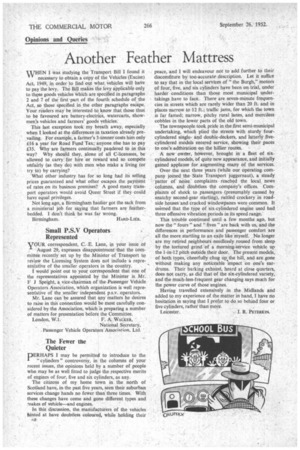Another Feather Mattress
Page 116

If you've noticed an error in this article please click here to report it so we can fix it.
WHEN I was studying the Transport Bill I found it necessary to obtain a copy of the Vehicles (Excise) Act, 1949, in order to find out what. vehicles will have to pay the levy. The Bill makes the levy applicable only to those goods vehicles which are specified in paragraphs 2 and 7 of the first part of the fourth schedule of the Act, so those specified in the other paragraphs escape. Your readers may be interested to know that those thus to be favoured are battery-electrics, watercarts, showtneWs vehicles and farmers' goods vehicles. This last exception took my breath away, especially when I looked at the differences in taxation already prevailing. For example, a farmer's 3-tonner costs him only £16 a year for Road Fund Tax; anyone else has to pay £35. Why are farmers continually pandered to in this way? Why should they, alone of all C-licensees, be allowed to carry for hire or reward and so compete unfairly (as they do) with men who make a living (or try to) by carrying? , What other industry has for so long had its selling prices guaranteed and what other escapes the payment of rates on its business premises? A good many transport operators would avoid Queer Street if they could have equal privileges. Not long ago, a Birmingham haulier got the sack from a ministerial job for saying that farmers are featherbedded. I don't think he was far wrong. Birmingham. HARD-LIER.
Small P.S.V Operators Represented
YOUR correspondent, C. E. Lane, in your issue ot August 29, expresses disappointment that the committee recently set up by the Minister of Transport to review the Licensing System does not include a representative of the smaller operators in the country. I would point out to your correspondent that one of the representatives appointed by the Minister is Mr. F J Speight, a vice-chairman of the Passenger Vehicle Operators Association, which organization is well representative of the smaller independent p.s.v. operators. Mr. Lane can be assured that any matters he desires to raise in this connection would be most carefully considered by the Association, which is preparing a number of matters for presentation before the Committee. London, W.1. F. A. WALKER, National Secretary, Passenger Vehicle Operators Associai inn. Ltd.
The Fewer the Quieter
PERHAPS I may be permitted to introduce to the " cylinders " controversy, in the columns of your recent issues, the opinions held by a number of people who may be as well fitted to judge the respective merits of engines of four, five and six cylinders, as any. The citizens of my home town in the north of Scotland have, in the past five years, seen their suburban services change hands no fewer than three times. With these changes have come and gone different types and _makes of vehicle—and engines. In this discussion, the manufacturers of the vehicles hinted at have doubtless coloured, while holding their r.8 peace, and I will endeavour not to add further to their discomfiture by too-accurate description. Let it suffice to say that in the local services of "the Burgh," motors of four, five, and six cylinders have been on trial, under harder conditions than those most municipal undertakings have to face. There are seven-minute frequencies in streets which are rarely wider than 20 ft. and in places narrow to 12 ft.; traffic jams, for which the town is far famed; narrow, pitchy rural lanes, and merciless cobbles in the lower parts of the old town. The townspeople took pride in the first semi-municipal undertaking, which plied the streets with sturdy fourcylindered singleand double-deckers, and latterly fivecylindered models entered service, showing their paces to one's admiration on the hillier routes.
A new owtTer, however, brought in a fleet of sixcylindered models, of quite new appearance, and initially gained applause for augmenting many of the services. Over the next three years (while our operating company joined the State Transport juggernaut), a steady patter of noise complaints reached the local news columns, and doubtless the company's offices. Complaints of shock to passengers (presumably caused by snatchy second-gear starting), rattled crockery in roadside houses and cracked windowpanes were common. It seemed that the type of six-cylindered engine used had three offensive vibration periods in its speed range. This trouble continued until a few months ago, but now the " fours " and " fives " are back with us, and the differences in performance and passenger comfort are all the more startling to an exile like myself. No longer are my retired neighbours needlessly roused from sleep by the tortured grind of a morning-service vehicle up the 1-in-12 pitch outside their door. The present models, of both types, cheerfully chug up the hill, and are gone without making any noticeable impact on one's eardrums. Their barking exhaust, heard at close quarters, does not carry, as did that of the six-cylindered variety, and the much-less-frequent gear changing says much for the power curve of those engines. Having travelled extensively in the Midlands and added to my experience of the matter in hand, I have tio hesitation in saying that I prefer to do so behind four or five cylinders, rather than more. Leicester. I. R. PETERKIN.




































































































































































































































































































